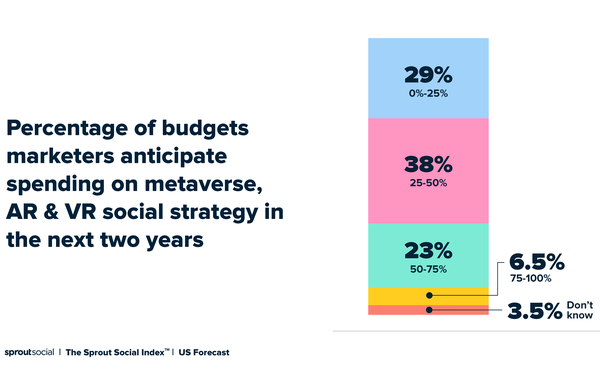
Although the metaverse
still remains logistically undefined, 67% of 500 marketers recently surveyed by Sprout Social are planning to invest at least a quarter of their budget in metaverse tactics related to the evolution of
social media over the next year.
According to the study, also involving a survey of 1,000 U.S. consumers, 33% of
marketers believe their brands are already applying augmented reality (AR) and virtual reality (VR) technology in their social strategies, and 28% are integrating early metaverse efforts.
However, only 24% of consumers report anticipating using the metaverse over the next 12 months –– 17%
for NFTs and 39% for AR and VR.
“Similar to the adoption of social media in the early 2000s, brands
need to plan and prepare regardless of consumers’ readiness now, or they’ll miss out on future opportunities,” says Jamie Gilpin, CMO at Sprout Social. “As brands identify more
ways for social to inform entire business functions, those who use this time to test and learn will ultimately gain a competitive advantage in this next evolution of social.”
Right now, based on Sprout Social’s report, social media users are most interested in short-form video and the platforms that support it.
In 2020, half of consumers preferred short-form content, and now that proportion has grown to two-thirds.
Thirty-eight percent of consumers report that they are planning to use short-form video pioneer TikTok, which is up 21% from 2020.
But while marketers have lowered their strategic focus on YouTube –– to 35%, down from 52% in 2020 –– more than half of consumers are planning to
invest more time there.
The new report also shows that marketers (52%) are struggling to find experienced talent, identifying this as their top challenge of
the year.
Eighty-eight percent of marketers plan to hire an additional team member in the next two years. To expand focus on social media, two-thirds of marketers plan to hire to fill
between 2 and 6 positions.
In terms of companies addressing sensitive issues, 73% of Gen Z and 77% of Millennials
think brands should take a public stand and raise awareness.
As company alignment with personal values is
now 74% more important to consumers than it was in 2020, almost half of marketers think it is important to speak out and stay culturally relevant, but 66% struggle to push their companies and
leadership to do so.
Customer care has also become a higher priority for social media users. Sprout Social
finds that when a brand takes too long to respond on social, 36% of them share the negative experience with friends and family, 31% won’t complete a purchase, and 30% will buy from a
competitor.
“Fortunately, consumers and marketers are in sync on preferred channels for customer
care,” says Sprout Social in a recent statement. “With consumers turning to Facebook, Instagram and YouTube, and brands to Facebook, Instagram and Twitter.”
Lastly, the report suggests that if creator partnerships are not formed correctly, there can be immediate consequences.
For example, 81% of consumers say
they will unfollow creators who post sponsored content more than a few times a week.